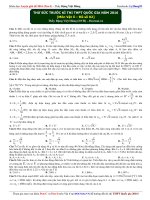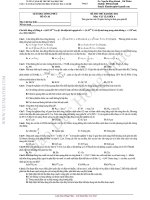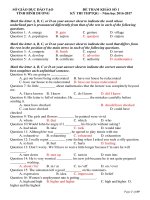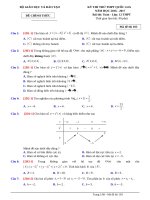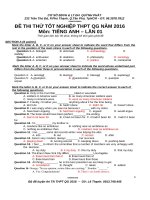ĐỀ THI THỬ tốt NGHIỆP THPT QUỐC GIA 2022 TIENG ANH 2
Bạn đang xem bản rút gọn của tài liệu. Xem và tải ngay bản đầy đủ của tài liệu tại đây (85.96 KB, 10 trang )
45. Đề thi thử TN
THPT năm 2022 môn
Tiếng Anh - THPT
Chuyên Lam Sơn -
Thanh Hóa (Lần 2)
(File word có lời giải
chi tiết)
Mark the letter A, B,
C,
answer
to
indicate the word that
differs from the other
three in the position of
primary stress in each
of
sheet
or
D
the
on
your
following
questions.
Question 1. A. connect
B. conclude
constant
D. construct
C.
Question
2.
A.
dictation
B. organize
critical
C.
D. furious
Mark the letter A, B,
C,
answer
indicate
sheet
to
or
D
on
the
your
word
whose underlined part
differs from the other
three in pronunciation
in each of the following
questions.
Question
3. A. steak
B. break C.
great
wanted
B. watched
C.
D. bread
Question
4.
A.
landed
D. planted
Mark the letter A, B, C
or D on your answer
sheet to indicate the
word(s) CLOSEST in
meaning
underlined word(s) in
to
the
each of the following
questions.
Question
only
applied for this business
view
to accumulating first-
with
5. I
a
hand experience.
A.
penetrating
Question
attaining
B. gaining
C.
D. accomplishing
6. The company will only employ competent engineers, so they want to see evidence of their work
as well as the references from their previous employers.
A. inconvenient
B. ambitious
C. proficient
D. unqualified
Mark the letter A, B, C, or D on your answer sheet to indicate the correct answer to each of
the following questions.
Question 7. Mysteriously, the light came on ______ no one was near the switch.
A. because
B. hence
C. however
D. although
C. The eldest
D. The older
Question
8. ______ he got, the more forgetful he became.
A. The elder
B. The oldest
Question 9. Clare was ______ her homework when her boyfriend called.
A. halfway through
B. in the middle of
C. in between
D. at the centre
Question
10. The government's major ______ has not only included legal, economic, and political gains but
also changed the ways in which people live, dress, dream of their future and make a living.
A. civilization
B. power
C. achievement
D. status
C. couldn't we
D. hadn't we
Question 11. We'd better ask for help, _______?
A. wouldn't we
B. shouldn't we
Question
12. Nobody believed him although he managed to convince them _____ his innocence.
A. in
B. at
C. of
D. on
Question 13. My mom was cooking _______.
A. while my dad was talking on the phone
B. as my dad talked on the phone
C. as my dad was talking on the phone
D. while my dad talked on the phone
Question
14. Students are not allowed to handle these chemicals unless they _______ under the supervision
of a teacher.
A. are
B. were
C. have been
D. had been
Question 15. As a young actress, Linda tried to resist the _______ to move to Hollywood.
A. temptingly
B. tempt
C. temptation
D. tempting
Question
16. Mr. Brown ______ reading the letter when the telephone on his desk rang.
A. was just finishing
B. just finished
C. had just finished
Question 17. The other witnesses will _______ what I say.
D. has just finished
A. bring in
B. bear out
C. break down
D. back away
Question
18. When I moved to the current flat, the only thing I left behind was a(n) ______ table.
A. old square wooden
B. square old wooden
C. square wooden old
D.
old
wooden
square
Question 19. “I'm _______ to listen to your pathetic excuses," she said.
A. sick and tired
B. sick to death
C. having enough
D. in no mood
Question
20. If you don't want your business to _______ bankrupt, avoid consulting those willing to step out
on a limb.
A. go
B. take
C. come
D. pay
Question 21. As _______ about this change of schedule earlier, I arrived at the meeting late.
A. had not been informed
B. not having informed
C. not informed
D. not being informed
Read the following passage and mark the letter A, B, C or D on your answer sheet to indicate
the correct answer to each of the following questions from 22 to 28.
Have you ever entered a tropical rainforest? It's a special, dark place completely different from
anywhere else. A rainforest is a place where the trees grow very tall. Millions of kinds of animals,
insects, and plants live in the rainforest. It is hot and humid in a rainforest. It rains a lot in the
rainforest, but sometimes you don't know it's raining. The trees grow so closely together that rain
doesn't always reach the ground.
Rainforests make up only a small part of the Earth's surface, about six percent. They are found in
tropical parts of the world. The largest rainforest in the world is the Amazon in South America. The
Amazon covers 1.2 billion acres, or almost five million square kilometers. The second largest
rainforest is in Western Africa. There are also rainforests in Central America, Southeast Asia,
Northeastern Australia, and the Pacific Islands. Rainforests provide us with many things. In fact, the
Amazon Rainforest is called the "lungs of our planet" because it produces twenty percent of the
world's oxygen. One fifth of the world's fresh water is also found in the Amazon Rainforest.
Furthermore, one half of the world's species of animals, plants, and insects live in the Earth's
rainforests. Eighty percent of the food we cat first grew in the rainforest. For example, pineapples,
bananas, tomatoes, corn, potatoes, chocolate, coffee, and sugar all came from rainforests. Twentyfive percent of the drugs we take when we are sick are made of plants that grow only in rainforests.
Some of these drugs are even used to fight and cure cancer. With all the good things we get from
rainforests, it's surprising to find that we are destroying our rainforests. In fact, 1.5 acres, or 6,000
square meters, of rainforest disappear every second. The forests are being cut down to make fields
for cows, to harvest the plants, and to clear land for farms. Along with losing countless valuable
species, the destruction of rainforests creates many problems worldwide. Destruction of rainforests
results in more pollution, less rain, and less oxygen for the world.
(Adapted from Reading Challenge 2 by Casey Malarcher and Andrea Janzen)
Question 22. The word "that" in paragraph 3 refers to ______.
A. rainforests
B. pineapples, bananas, tomatoes, corn, potatoes, chocolate, coffee, and sugar
C. the drugs
D. plants
Question
23. The following are the facts about rainforests, EXCEPT ______.
A. The only places to see rainforests are in tropical zones.
B. There's a considerable variety of plants and animals in the rainforests.
C. Rainforests account for about one sixth of the Earth's surface.
D. The rainforest in Western Africa ranks second after the Amazon in South America in the
covered area.
Question 24. Why don't people know it's raining in the rainforests?
A. Because the branches are too dense for the rain to touch the ground.
B. Because they are the habitats of millions of flora and fauna.
C. Because it hardly rains in the rainforests.
D. Because the trees grow very tall there.
Question
25. What can be inferred from the last passage?
A. The consequences of deforestation were greater than what people can imagine.
B. The more rainforests are destroyed, the harder people's life will become.
C. Everyone is not aware of the significance of the rainforests.
D. People's economic benefits are more important than environmental problems.
Question 26. What is the author's main idea in the passage?
A. To explain why people have destroyed a large area of tropical rainforests.
B. To prove that rainforests are indispensable in our lives.
C. To prevent people from damaging tropical rainforests.
D. To provide factual information about tropical rainforests for readers.
Question
27. The word "countless" in paragraph 3 could be best replaced by ______.
A. trivial
B. numberless
C. meaningless
D. derisive
Question 28. The word "humid” in the first paragraph is closest in meaning to _______.
A. cloudy
B. dry
C. overwhelmed
D. moist
Mark the letter A, B, C, or D on your answer sheet to indicate the underlined part that needs
correction in each of the following questions.
Question 29. The Beatles split up in 1970 and its members follow their individual careers.
A. up
B. careers
C. its
D. follow
30. Despite the fact that it has been a long debate, I hope that the dispute will be
settled without resource to litigation.
A. be settled
Question
31. Over time,
B. Despite
different cultures have
C. litigation
developed its own gift
D. resource
giving customs
and
traditions.
A. gift giving
B. cultures
C. Over
D. its
Mark the letter A, B, C or D on your answer sheet to indicate the word(s) OPPOSITE in
meaning to the underlined word(s) in each of the following questions.
Question 32. John: “I think we have done enough work today. I'm feeling tired now.”
Alice: “Let's call it a day and hit the hay.”
A. eat something
B. take a bath
C. stay awake
D. go to sleep
Question
33. It's only quite recently that the long-lasting and devastating effects of such chemicals on
wildlife have come to light.
A. flexible
B. durable
C. effective
D. transient
Read the following passage and mark the letter A, B, C, or D on your answer sheet to indicate
the correct word or phrase that best fits each of the numbered blanks from 34 to 38.
Amy Tan was born on February 19, 1952 in Oakland, California. Tan (34) _______ up in Northern
California, (35) _______ when her father and older brother both died from brain tumors in 1966,
she moved with her mother and younger brother to Europe, where she attended high school in
Montreux, Switzerland. She returned to the United States for college. After college, Tan worked as a
language development consultant and as a corporate freelance writer. In 1985, she wrote the story
"Rules of the Game" for a writing workshop, which (36) _______ the early foundation for her first
novel The Joy Luck Club. Published in 1989, the book explored the relationship between Chinese
women and their Chinese-American daughters, and became the longest-running New York Times
bestseller for that year. The Joy Luck Club received numerous awards, including the Los Angeles
Times Book Award. It has been translated into 25 languages, including Chinese, and was made into
a major motion picture for (37) _______ Tan co-wrote the screenplay. Tan's (38) ____ works have
also been adapted into several different forms of media.
Question 34. A. grew
B. made
C. lived
D. brought
35. A. moreover
B. so
C. but
D. however
Question 36. A. lied
B. laid
C. lay
D. lain
B. what
C. whom
D. that
C. other
D. another
Question
Question
37. A. which
Question 38. A. the other B. others
Mark the letter A, B, C, or D on your answer to indicate the sentence that best completes each
of the following exchanges.
Question 39. Dieter: “Wow, you have such a beautiful voice.”
Elena: “Thank you. _______”
A. I would love to take credit.
B. You must be kidding
C. It makes my day to hear that
D. I put a lot of thought into this
Question
40. Brian: “If you know how to make use of online learning, it even offers you more advantages
than traditional classrooms.”
- Clara: “_______.”
A. Absolutely
B. I could agree with you more
C. No way. That's so true
D. I'm afraid I agree
Mark the letter A, B, C, or D on your answer sheet to indicate the sentence that best combines
each pair of sentences in the following questions.
Question 41. The chopper took off at 5 p.m. It exploded at 5:05 p.m.
A. Hardly had the chopper taken off when it exploded.
B. Scarcely had the chopper taken off than it exploded.
C. Hardly did the chopper take off than it exploded.
D. Hardly did the chopper take off when it exploded.
Question
42. Michael Faraday was employed by the Royal Institution. There, he investigated the connections
between electricity, magnetism and motion.
A. When Michael Faraday was employed by the Royal Institution, he investigated the connections
between electricity, magnetism and motion.
B. The Royal Institution employed Michael Faraday to investigate the connections between
electricity, magnetism and motion.
C. Michael Faraday was employed by the Royal Institution, where he investigated the connections
between electricity, magnetism and motion.
D. After he investigated the connections between electricity, magnetism and motion, Michael
Faraday was employed by the Royal Institution.
Read the following passage and mark the letter A, B, C, or D on your answer sheet to indicate
the correct answer to each of the following questions from 43 to 47.
For many American university students, the weeklong spring break holiday means an endless party
on a sunny beach in Florida or Mexico. In Panama City Beach, Florida, a city with a permanent
population of around 36,000, more than half a million university students arrive during the month of
March to play and party, making it the number one spring break destination in the United States. A
weeklong drinking binge is not for anyone, however, and a growing number of American university
students have found a way to make spring break matter. For them, joining or leading a group of
volunteers to travel locally or internationally and work to show problems such as poverty,
homelessness, or environmental damage makes spring break a unique learning experience that
university students can feel good about. Students who participate in alternative spring break projects
find them very rewarding. While most university students have to get their degrees before they can
start helping people, student volunteers are able to help people now. On the other hand, the
accommodations are far from glamorous. Students often sleep on the floor of a school or spend the
week camping in tents. But students only pay around $250 for meals and transportation, which is
much less than some of their peers spend to travel to more traditional spring break hotspots.
Alternative spring break trips appear to be growing in popularity at universities across the United
States. Students cite a number of reasons for participating. Some appreciate the opportunity to
socialize and meet new friends. Others want to exercise their beliefs about people's obligation to
serve humanity and make the world a better place. Whatever their reason, these students have
discovered something that gives them rich rewards along with a break from school work.
Question 43. The word “them” in paragraph 1 refers to a _______.
A. degrees
B. students
C. projects
D. people
Question
44. The word “cite” in paragraph 2 probably means _______.
A. list
B. invent
C. avoid
D. get
Question 45. How many university students travel to Panama Beach City every March for spring
break?
A. Around 36,000
B. Around 500,000
C. Around 10,000
D. Around 50,000
Question
46. Which of the following is NOT mentioned as a problem that alternative spring break trips try to
help solve?
A. Overpopulation
B. Environment damage C. Homelessness
D. Poverty
Question 47. What is the passage mainly about?
A. American students' social life
B. Students' alternative spring breaks
C. Students' travelling preferences
D. A traditional approach to spring breaks
Mark the letter A, B, C, or D on your answer sheet to indicate the sentence that is closest in
meaning to each of the following questions.
Question 48. "I agree that I am narrow-minded," said the manager.
A. The manager promised to be narrow-minded.
B. The manager admitted being narrow-
minded.
C. The manager denied being narrow-minded.
D. The manager refused to be narrow-
minded.
Question
49. We have some minutes to spare so you don't have to be hurried.
A. There is no need for you to be hurried as we have time to spare.
B. You must not be hurried as we have plenty of time to spare.
C. You should be hurried as we have no time to spare.
D. It is necessary for you not to be hurried as we have time to spare.
Question 50. It's such a pity my mother can't attend my birthday party.
A. I am very sorry that my mother didn't attend my birthday party.
B. If only my mother could attend my birthday party.
C. If only my mother had attended my birthday party.
D. I wonder why my mother can't attend my birthday party.
ĐỀ KHẢO SÁT
CHẤT LƯỢNG THI
THPT QUỐC GIA
2022
Bài thi: NGOẠI NGỮ;
Môn thi: TIẾNG ANH
THPT CHUYÊN
LAM SƠN - THANH
HÓA (LẦN 2)
Thời gian làm bài: 60
phút; 50 câu trắc
nghiệm
HƯỚNG DẪN GIẢI
CHI TIẾT
Mark the letter A, B,
C,
answer
to
indicate the word that
differs from the other
three in the position of
primary stress in each
of
sheet
or
D
the
on
your
following
questions.
Question 1. A. connect
B. conclude
constant
D. construct
C.
Giải thích:
A. connect /kəˈnekt/ (v):
kết nối
B. conclude /kənˈkluːd/
(v): kết luận
C. constant /ˈkɒn.stənt/
(adj): không thay đổi,
bất biến
D. construct /kənˈstrʌkt/
(v):
xây
dựng
(nhà
cửa…)
Đáp án C có trọng âm
rơi vào âm tiết thứ nhất,
các đáp án còn lại trọng
âm rơi vào âm tiết thứ
2.
→ Chọn đáp án C
Question
2.
A.
dictation
B. organize
critical
C.
D. furious
Giải thích:
A. dictation /dɪkˈteɪ.ʃən/
(n): sự đọc chính tả
B. organize /ˈɔː.ɡən.aɪz/
(v): tổ chức, thiết lập
C.
(adj):
critical
/ˈkrɪt.ɪ.kəl/
phán; then chốt
chỉ
trích,
phê
D. furious /ˈfjʊə.ri.əs/ (adj): giận dữ
Đáp án A có trọng âm rơi vào âm tiết thứ 2, các đáp án còn lại trọng âm rơi vào âm tiết thứ nhất.
→ Chọn đáp án A



